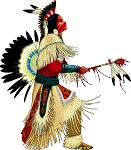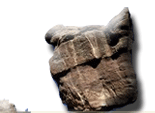|
Nathan C. Meeker
Many years ago, the Ute nation lived in the country they called the Shining Mountains. This country was a "great living" land that sloped downward from lofty mountain peaks filled with deer, bear, and elk. This country sparkled with lakes and rivers that rolled gently down to the brush and to the high desert where antelope and buffalo grazed.
 One band, the White River Utes, settled amidst this country in a green valley on the bank of the White River where they raised their prized racing ponies. This area of beautiful pasture land has been named Powell Park after John Wesley Powell who resided with the Utes while he explored the area in the winter of 1868-69. Powell Park later became the site of the Agency of the White River. One band, the White River Utes, settled amidst this country in a green valley on the bank of the White River where they raised their prized racing ponies. This area of beautiful pasture land has been named Powell Park after John Wesley Powell who resided with the Utes while he explored the area in the winter of 1868-69. Powell Park later became the site of the Agency of the White River.
Nathan C. Meeker arrived in the White River Valley in 1878, coming from Greeley, Colorado, where he was instrumental in establishing a "Christian Communal Society". Owing a large debt to Horace Greeley forced Meeker to Accept the position of Indian Agent in the White River Valley.
The original site of the Indian Agency was approximately 6 miles east of Meeker along the river. Meeker, however had the agency disassembled and floated the logs downstream to the Powell Park location.
Meeker was in a hurry to force the Indians to forego their historical way of life and turn them into Christian Farmers. A severe clash of cultures resulted. Tensions ran very high for a long period of time. Failure of the U.S. Government to provide the items promised to the Indians led to their belief that Meeker was lying to them. Two particular points built a wall between the two factions. 1. To the Ute, farming was woman's work. 2. The horse was the Ute's most prized possession.
He was later to lose his life in this spot during the Meeker Massacre which took place on September 29, 1879. During the massacre, the Ute Indians destroyed the Agency on the White River, killing Indian Agent Meeker and ten male civilian employees. The women and children were kidnapped but were later released due to the heroic efforts of Colonel Adams, Chipeta and Chief Ouray.
Historical plaques now mark the site of the massacre and the Thornburgh Battle where Major Thornburgh, Commander of the 5th Calvary, was engaged in battle by the Ute Indians while enroute to the White River Agency to assist Nathan Meeker. A dramatic reenactment of the Meeker Massacre is performed every year duringMeeker's 4th of July Range Call Celebration.
Meeker, the county seat of Rio Blanco County, grew around the "Military Camp on the White River," an army base established to keep peace after the massacre. They established a permanent military camp around a parade ground which now houses the courthouse and grade school buildings.
Several hundred soldiers were quartered here and many buildings were erected; barracks, officer's quarters, a hospital building, a trading post, officers' and soldiers clubs and civilian housing. When the army left in 1883, all of their buildings were sold at auction to civilians. The ready-made town was named in memory of the slain Indian Agent, Nathan C. Meeker. Several of the early buildings still exist including the historic Meeker Hotel which was rebuilt in 1896 and three of the original army officer's quarters, one of which houses the White River Museum.
Over the years, adventurous pioneers moved into the area, starting up new businesses and establishing ranches, many of which still operate today. The town of Meeker was the first, and for more than 20 years, the only incorporated town in all northwestern Colorado. It was the hub, the business and banking center of that vast territory.
Meeker today is a very stable agricultural community producing cattle, sheep, small grains, and hay with additional industries of coal, oil, natural gas and lumber supporting the residents. The area also contains large amounts of oil shale. The Piceance Basic is estimated to contain 1.3 trillion barrels of oil equivalent.
This page was contributed by Michael Kay (970) 878-4042
|
|



 One band, the White River Utes, settled amidst this country in a green valley on the bank of the White River where they raised their prized racing ponies. This area of beautiful pasture land has been named Powell Park after John Wesley Powell who resided with the Utes while he explored the area in the winter of 1868-69. Powell Park later became the site of the Agency of the White River.
One band, the White River Utes, settled amidst this country in a green valley on the bank of the White River where they raised their prized racing ponies. This area of beautiful pasture land has been named Powell Park after John Wesley Powell who resided with the Utes while he explored the area in the winter of 1868-69. Powell Park later became the site of the Agency of the White River.
